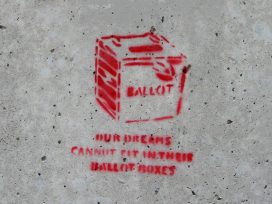
Although it makes for a great dramatic effect, the theories of the sudden death of democracy disregard the gradual erosion and capture of institutions, and the role of the populace – argues political scientist John Keane.
“Undoubtedly, leftwingers exist who can find excuses for the Soviet penal universe. But I don’t regularly discuss matters with them”. Thus responded Hungarian political scientist Gáspár Miklós Tamás to Romanian philosopher Andrei Plesu’s assertion in “Dilema veche” 243 (2008) that “The Left […] hides the Gulag behind a veil of intelligence, nuance, and ‘historical necessity’.” “Quite honestly, you are too equidistant for my liking”, writes Plesu in his concluding comment.
It was a pleasure, my dear fellow, to offer to Dilema Veche the body of the letter in which you reprimanded me for my warped interpretation of your lively intervention in Sofia. As I told you in an email a few days ago, your written Romanian is so accurate that, for an aesthete like myself, it almost no longer matters what you say. However, I apologize if I have incorrectly represented your words. On the other hand, however many misunderstandings come between us, it is clear that we will remain, with or without them, divided on the matter: you defending with irritation and grace a utopian leftwing paradise, and I rambling endlessly from the Right about the ease (sprezzatura?) with which you theorize what for many millions of people was pure hell. However, for the sake of the dialogue, I will pick up the gauntlet you have thrown down.
For the benefit of the readers, but also because unfortunately I do not possess the same expertise as you, I will simplify your thesis, trying not to distort it again. You examine two propositions that you qualify as “contradictions”.
1) “Real socialism” was not true socialism, but rather a hypocritical deformation of Marxist theory.
2) “Real socialism” was a consistent application of Marxist theory, hence it was true socialism. Its failure is simultaneously the failure of the theory and its removal from the register of viable political systems.
A few brief observations: I don’t think that the first proposition was, as you say, formed before 1989 and the second proposition formed after 1989. In the debate about communism, it is my opinion that they have coexisted for a long time. You have an inclination (moderate, albeit clear) towards the first proposition, the wording of which you play close attention to: you speak of Soviet society and of the Bolshevik system, but when you say “communist” you do so in quotation marks. The problem is that you reduce the “communist” connotations of their failures. However much it failed, it was a “Bolshevik” and “Soviet” failure. The Bolsheviks and Soviets “stained” – as Ion Iliescu put it – true communism; they compromised it, they applied it viciously.
According to this first proposition, which you prefer, communism is not disabled by “real socialism”; in other words, it cannot be exhausted by historic trials. It must be given another chance, and another one, again and again until maybe, after new hecatombs, it can show its generous, beneficent, “scientific” face. You admit that the first proposition is “simple”. On the other hand, the second proposition seems “false” to you. To identify communism with the USSR, China, eastern Europe, the Gulag, Canal, Aiud, and so on is as abusive as to identify liberalism with the Belgians’ crimes in the Congo and genocide in general. So, you prove yourself to be equidistant. You cannot agree with Losurdo or Canfora (“still, great intellectuals”), nor with those who “find excuses for the Soviet penal universe” (“Soviet”, of course, for in the other communist countries prisons are irrelevant…). Quite honestly, you are too equidistant for my liking. A judgment of communism taken from the point of view of the Gulag seems to me more legitimate than a judgment of liberalism from the point of view of genocide. I see Stalin as having been an exponent of Marxist-Leninism more than Hitler was a follower of John Stuart Mill. From what I have seen – what you are probably anticipating – I am more aligned with the second proposition. If nothing else, “real socialism” looked like it did and if, regardless of local context, national “adaptations”, experiments and all kinds of other desperate efforts, it produced an effect so similar, I have the right to doubt its very foundations. I cannot make an abstraction of historical data in the name of imperceptible glory. It would not even be in the spirit of Karl Marx.
As for your post scriptum, I confess to having read it with a certain difficulty. I don’t understand what you mean by defining conservatism as the “playful gesture of mastery without ulterior motive”, or by qualifying “the eternal Left”, following Badiou, as a “regime of truth”, “a non-hierarchical, de-centred, disseminated truth”, and so on. Jocular conservatism? Very well! Do you have anything against Churchill? Do you prefer the series of communists that take themselves so seriously that they can perpetrate murders? Communism as a “regime of truth”? Don’t you find an irony there? What made you become a dissident against a “truth” so “obvious” and, above all, as “splendid” as a discourse by Galileo Galilei? I know, you’ll say that your “communism” is something else, that – as our eternal Pristanda said – “there’s something else in your soul”. Losurdo? Badiou? Let me scandalize you a little: two smart guys of opaque stupidity. The kind of intellectuals that “cheat the world with their games”. I don’t do polemics. (Life’s too short.) I just describe them.
Remaining your faithful, full of a paradoxical sympathy, “class enemy”. May all the conflicts of the century resemble those between us.
Andrei Plesu
Published 16 June 2009
Original in Romanian
Translated by
Anna Codrea-Rado
First published by Dilema veche 247 (2008) (Romanian version)
Contributed by Dilema veche © Andrei Plesu / Eurozine
PDF/PRINTSubscribe to know what’s worth thinking about.

Although it makes for a great dramatic effect, the theories of the sudden death of democracy disregard the gradual erosion and capture of institutions, and the role of the populace – argues political scientist John Keane.

For all its acuity, John Keane’s theory of democide risks confusing democratic degradation with a transformation of the political debate. Not only that, it fails to account for the radicalization of authoritarian systems once democracy has been killed.